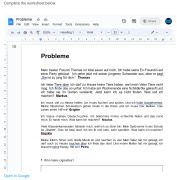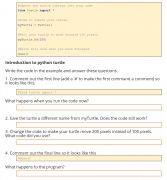 |
German
Present Tense
by Anyholland
|
Lesson
Date: Monday, 12 June 2023 14:22
- Key Stage 3
A lesson resource on the present tense in German. Starting with regular verbs then moving on to strong and irregular verbs.
Source: https://www.tes.com/teaching-resource/present-tense-in-german-6374640
|
|
 |
German
Present Tense
by Anyholland
|
 Google Docs Worksheets
Lesson Google Docs Worksheets
Lesson
Date: Monday, 12 June 2023 14:24
- Key Stage 3
A lesson resource on the present tense in German. Starting with regular verbs then moving on to strong and irregular verbs.
Source: https://www.tes.com/teaching-resource/present-tense-in-german-6374640
|
|
 |
German
Probleme
by Petermorris2001
|
Lesson
Date: Tuesday, 13 June 2023 13:30
- Key Stage 4
GCSE German higher reading comprehension questions on the topic of problems.
Source: https://www.tes.com/teaching-resource/25-gcse-style-higher-reading-questions-6323647
|
|
 |
German
Probleme
by Petermorris2001
|
 Google Docs Worksheets
Lesson Google Docs Worksheets
Lesson
Date: Tuesday, 13 June 2023 13:36
- Key Stage 4
GCSE German higher reading comprehension questions on the topic of problems.
Source: https://www.tes.com/teaching-resource/25-gcse-style-higher-reading-questions-6323647
|
|
 |
Chemistry
Properties of Alcohols
by HenrikHanson
|
Lesson
Date: Thursday, 01 June 2023 12:58
- UK
- OCR
- Key Stage 4
- The polarity of alcohols and an explanation, in terms of hydrogen bonding, of the water solubility and the relatively low volatility of alcohols compared with alkanes
- Classification of alcohols into primary, secondary and tertiary alcohols
Source: https://www.tes.com/teaching-resource/new-ocr-a-level-chemistry-alcohols-halogenoalkanes-and-analysis-11251309
|
|
 |
Chemistry
Properties of Alcohols
by HenrikHanson
|
 Google Docs Worksheets
Lesson Google Docs Worksheets
Lesson
Date: Thursday, 01 June 2023 13:21
- UK
- OCR
- Key Stage 4
- The polarity of alcohols and an explanation, in terms of hydrogen bonding, of the water solubility and the relatively low volatility of alcohols compared with alkanes
- Classification of alcohols into primary, secondary and tertiary alcohols
Source: https://www.tes.com/teaching-resource/new-ocr-a-level-chemistry-alcohols-halogenoalkanes-and-analysis-11251309
|
|
 |
Computer Science
Python Turtle Introduction
by Wurkbuk
|
Lesson
Date: Wednesday, 07 April 2021 20:58
Programming
- UAE
- Grade 7
An introduction to Python programming with the Turtle library. Students learn about basic code and how to draw using Turtle.
|
|
 |
Chemistry
Reactions of Alcohols
by HenrikHanson
|
 Google Docs Worksheets
Lesson Google Docs Worksheets
Lesson
Date: Thursday, 01 June 2023 12:45
- UK
- OCR
- Key Stage 4
- Combustion of alcohols
- Oxidation of alcohols by an oxidising agent, e.g. Cr2O72–/H+ (i.e. K2Cr2O7/H2SO4), including:
- The oxidation of primary alcohols to form aldehydes and carboxylic acids; the control of the oxidation product using different reaction conditions
- The oxidation of secondary alcohols to form ketones
- The resistance to oxidation of tertiary alcohols
- Elimination of H2O from alcohols in the presence of an acid catalyst and heat to form alkenes
- Substitution with halide ions in the presence of acid to form haloalkanes
Source: https://www.tes.com/teaching-resource/new-ocr-a-level-chemistry-alcohols-halogenoalkanes-and-analysis-11251309
|
|
 |
Biology
Stem Cells
by Littlemizzbarbie
|
 Google Docs Worksheets
Lesson Google Docs Worksheets
Lesson
Date: Thursday, 01 June 2023 11:48
- UK
- AQA
- Key Stage 4
Lesson For Cell Biology in new AQA Biology GCSE.
LO:
Define the term ‘stem cell’.
Describe where stem cells can be found in animals and plants.
Describe in simple terms how cells genetically identical to a patient could be obtained.
Describe how stem cells could be used to help treat some medical conditions.
Evaluate risks and benefits, as well as the social and ethical issues concerning the use of stem cells from embryos in medical research and treatments.
Source: https://www.tes.com/teaching-resource/stem-cell-new-aqa-biology-gcse-11772119
|
|
 |
Biology
The Brain
by Littlemizzbarbie
|
Lesson
Date: Thursday, 01 June 2023 10:00
- UK
- AQA
- Key Stage 4
LO:
Identify the cerebral cortex, cerebellum and medulla on a diagram and describe the function of each.
(HT) Describe the techniques used to map areas of the brain to their functions.
(HT) Evaluate the benefits and risks of procedures carried out on the brain and nervous system.
Source: https://www.tes.com/teaching-resource/the-brain-biology-only-new-aqa-biology-gcse-11694569
|
|